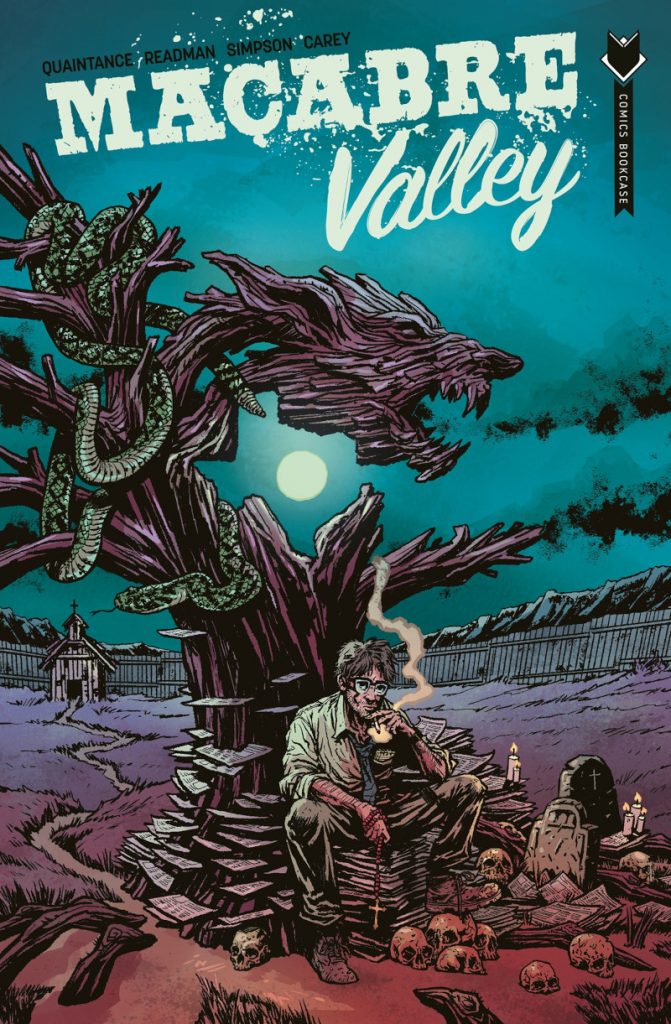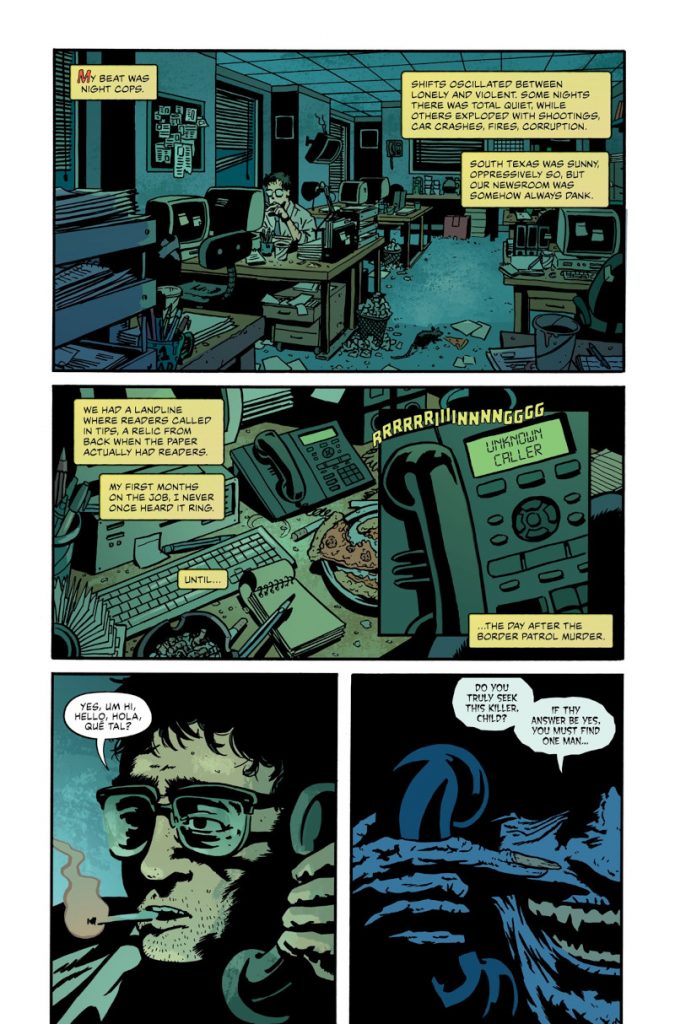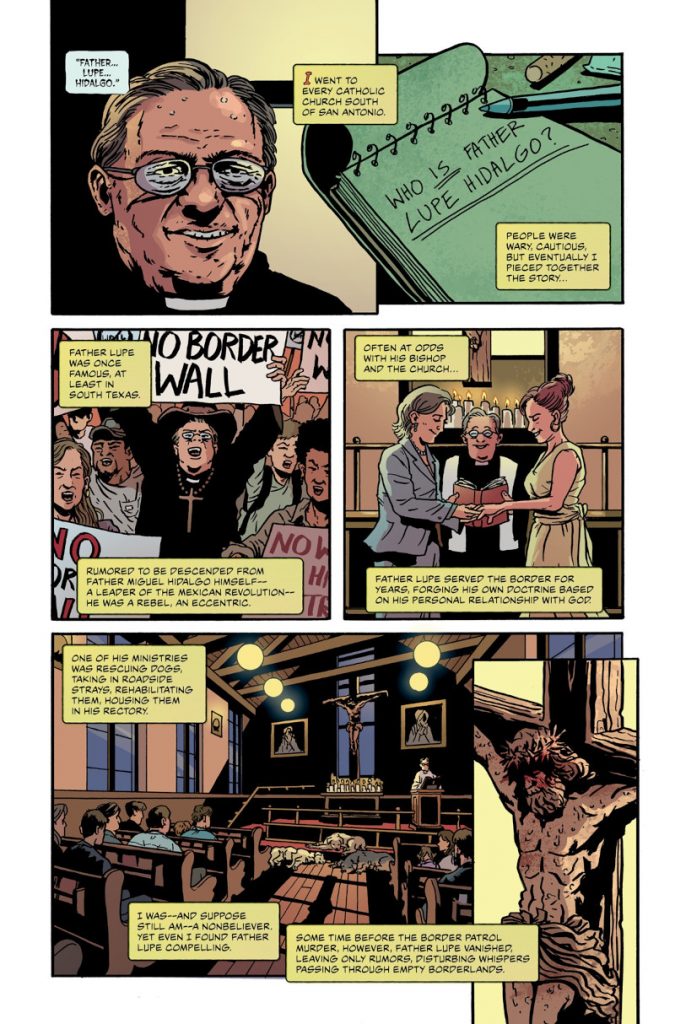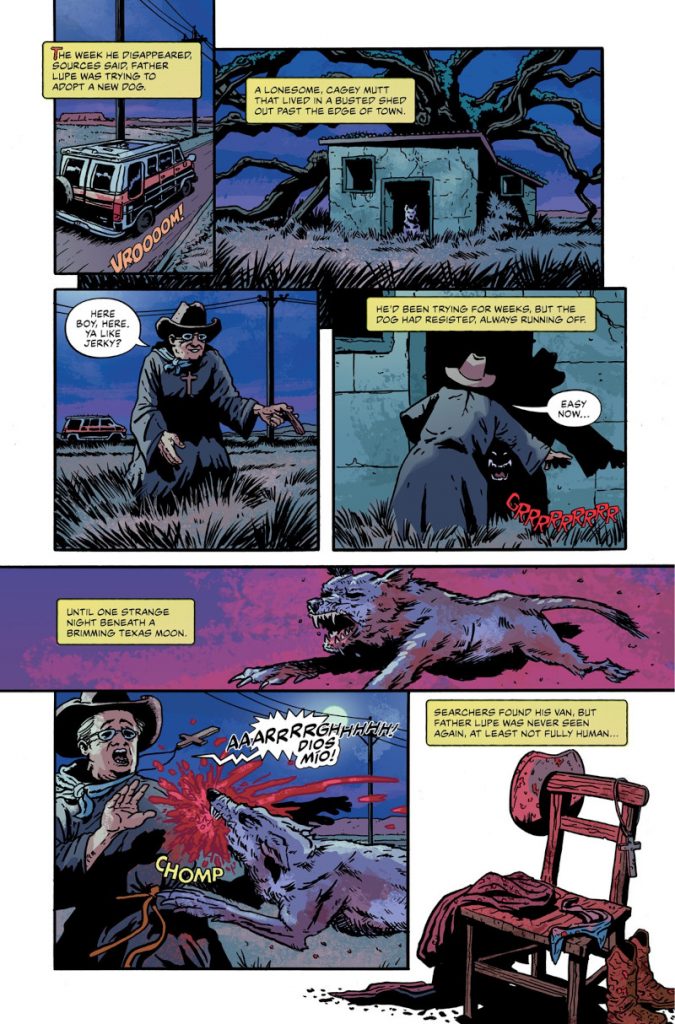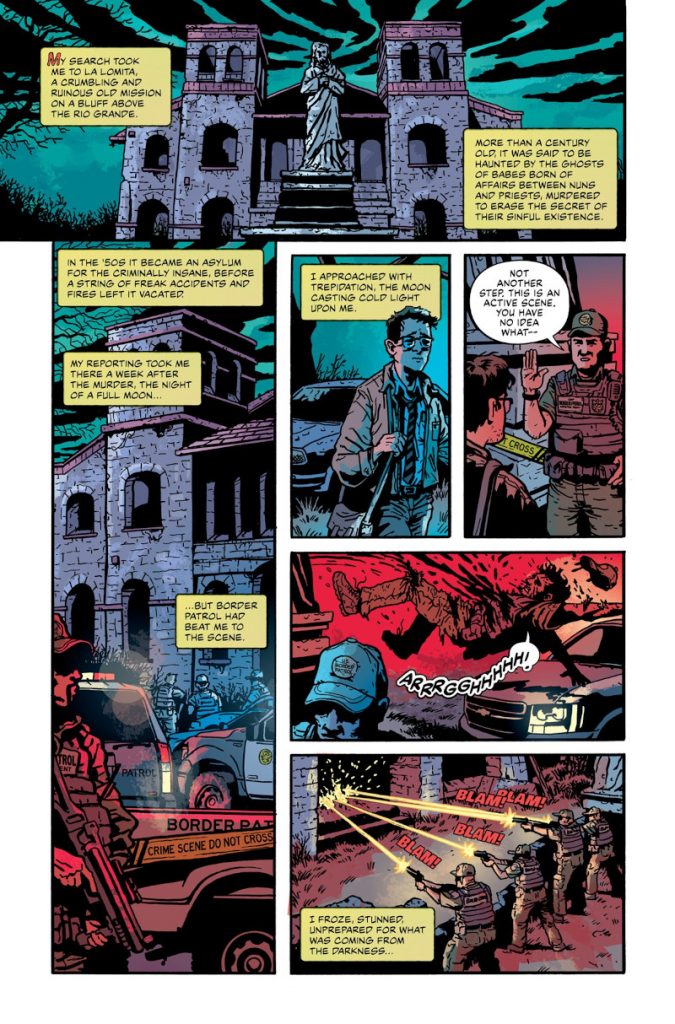“There’s No Real Science to It”: Zack Quaintance on Macabre Valley #1 and Building a Career in Comics as a Critic and Writer
For many, being a comics critic or journalist has is a gateway to becoming a comics creator later on. That doesn’t mean that’s why everyone does it, nor does it mean it’s a method that always leads to success on either front. Succeeding in that journey is a bit more rare, as it requires a varied skill set that allows someone to become an effective writer about comics and of comics. It’s hard to do.
Don’t tell Zack Quaintance that, though.
Because he’s already done it.
Quaintance is the Reviews Editor of the Eisner Award-winning comic site The Beat, and he’s also the writer of three different comics that have been successfully funded on Kickstarter. He’s effective at both roles, having cultivated his writing gifts in a way that allows him to deliver on each front. And he continues to do so, as his currently being Kickstarted project Macabre Valley #1 — which he’s doing with artist Anna Readman, colorist Brad Simpson, letterer Becca Carey, and designer Jared K. Fletcher — has already reached its goal with a long way to go in its campaign. What’s that book about? Here’s the rundown from its campaign page:
“A young reporter gets a job covering the night cops beat at a newspaper in South Texas. When a Border Patrol agent is gruesomely murdered, our hero must untangle a violent mystery with a beloved local priest and a werewolf at its dark center.”
I’ve found Quaintance to be an interesting figure since he started the now inactive comic site Comics Bookcase back in 2018, and with this new Kickstarter in the midst of its campaign, I thought it’d be a good time to chat with him about his path in comics and that current project. So, that’s what we did recently, as we hopped on a call and discussed the Kickstarter life, his path as a critic and creator, what the former taught him about the latter, where Macabre Valley #1 came from, collaboration and collaborators, Kickstarter realities, the state of comics journalism, and more.
It’s a great conversation with someone who is doing interesting things in every role he takes on, and you can read it in full below. It’s been edited for length and clarity, and it’s open for non-subscribers. If you enjoy what you read, though, consider subscribing to SKTCHD to read more like it or to support the fully independent, ad-free work that I do on the site.
We’re on day three of the Kickstarter grind. You’re almost to the goal line. 1 How are doing, Zack?
Zack Quaintance: I’m good. I’m probably refreshing the page too much. We’re getting right up on the edge of it. I think I’ll be able to exhale soon.
I’ve always been curious about how people operate when they have Kickstarter. If I was doing a Kickstarter, I would definitely refresh too much. Do you find yourself like falling into that trap?
Zack: Yeah, absolutely. Ultimately what happens is I start to set a time a day where I’m going to check it. After the inevitable slowdown hits, then I’ll have to regulate it. I’ll check it at lunch, I’ll check it at dinner, I’ll check it in the morning. Just kind of trying to not become compulsive about it.
Is this your second or third one?
Zack: This is my third one.
I’ve always heard that with Kickstarter, it’s exciting in the beginning as you’re getting all those people backing you. And then at the end, there’s a push because people want to get in before the whole thing closes. The lull in the middle, is that the toughest part to navigate?
Zack: Far and away. That part is always difficult. And with this being my third one, I know it’s coming. It comes for every Kickstarter, and I don’t expect it to be any easier than it’s been in the past. You start to feel like you’re never going to get another backer at a certain point, even though you know that’s not true.
I crowdfund everything I do, and sometimes I feel like I can brute force it by just giving it effort to bring people in. It never works, and success is always like the most random thing. Like the other day I had seven new subscribers to SKTCHD, and I have no idea where they came from. I imagine you probably get flurries where it’s just like completely inexplicable and you’re like, how could I recreate this with effort? You can’t.
Zack: Yeah, there’s no rhyme or reason to it. You’ll put out a set of social media posts where you reveal new art and you think, “This is going to be it. I’m going to get half a dozen people coming in.” And nothing. And then you’ll wake up after not having done any promo for a couple days and have five people and you just don’t understand where they came from.
You can guess that maybe somebody put me in their newsletter or something like that. But it’s not easy to tell.
You are a comics critic slash journalist. You are a comics creator. You’ve dedicated a lot of your life to the medium in a number of ways. Why comics? Why did you want to focus on comics?
Zack: You know, I actually got out of it for a little bit.
As a reader or writer?
Zack: I would read a little bit here and there. Whatever they had at libraries. But I stopped going to a local comic shop in my 20s. I was kind of like, “I’m going to be a serious writer, and I’m going to work on these novels and short stories and things.” But I couldn’t shake it. I kept reading comics at the library, and I wasn’t having any fun trying to write literary fiction and steeping myself in that world.
So, I just started reading more comics. By the time I got into my 30s I was totally back in. But I love stories of all types. Novels, movies, and everything. But there’s just something that pops in my brain differently with comics as a medium. It’s almost ineffable. I can’t really understand it entirely myself.
What is your day job? Are you still a reporter?
Zack: Yeah, I’m an editor for a trade journal. We have a magazine that comes out quarterly and we cover the way that a state and local government uses technology. A lot of times when I bring that up, people will be like, “oh, so are you doing international cybersecurity?” I’m like, “No, we’re doing when you use the DMV to renew your license online.” That’s the kind of stuff we cover. It’s important but pretty archaic and not the most exciting thing to talk about.
That’s part of what drew me back into comics. Once I had that job in my life, it stabilized a little bit. I wanted to start writing about something fun as well. And that’s what brought me to comics journalism.
That’s why I brought it up. I imagine sometimes you need something that’s a dramatically different flavor than what you do for your day job. I’m not saying that writing prose fiction or nonfiction is going to be like your job, but it would be closer to that than getting Anna to draw werewolves.
Zack: Absolutely. And when you’re writing prose, you’re sort of alone in the vacuum. You have to be your own check on quality and if what you’re trying to do is working. Comics are nice because you have the team to bounce things off and validate what you’re working on.
Did you become a critic because you wanted to become a creator? Or were those two things unrelated?
Zack: I wanted to be a creator first, and becoming a critic and running a website was, I felt, a way to verse myself in the industry to almost…I don’t want to use the phrase “study it,” but definitely learn more about it outside of just going to a comic book store and buying comics.
And then at the same time, it felt like I could give back a little bit. At the time I started my website, I’d been a professional journalist for a decade, and it felt like I could contribute a little bit here and there. Which I think has become truer over time as less people have gotten out of the space and there’s less people writing about comics on less websites.
I imagine looking at comics in a very analytical way, trying to like dig into them and everything like that, probably helped you figure out your own voice as a writer and how to operate and make a comic in some ways. Do you think your work as a critic has strengthened your work as a creator?
Zack: Absolutely. There are two ways it’s done that. The first is, like you said, you read a little different when you know you have to write about something. You read it a couple times. You look for different things. And you think about it in a more serious way than if you might just put it down and go on with your day.
Secondly, one of the main things I do at The Beat is similar to one of the things you do, where you just look at what’s coming out that week and recommend things. I do that every week. And I read the digital review copies that come in. I read about 20 to 25 new releases every week in. It’s almost compulsive to an extent. But that pushes me so I’m hyper aware of what’s coming out, what I like about what’s coming out, what I don’t like, and what I would like to do within that space.
If I remember correctly, part of your ethos at Comics Bookcase was you didn’t want to just look at the big books, right? And I imagine you’re not going to get an expanded version of your own voice if you just read, I don’t know, the latest Marvel comics. That’s no slander to Marvel, but it’s a certain flavor. But if you read broader, you’re probably going to end up with a more diverse voice for yourself.
Zack: Yeah. It might sound odd to say, but it almost helps you figure out your voice more by reading stuff you don’t like more than reading stuff you do like. You kind of get a list of things you don’t want to do, and you start to think about why that didn’t work for you, which kind of narrows down what might work for you and what you do want to do and how you do want to sound.
It’s important to know where your own road lies and the turns you don’t want to take on it, because otherwise, how are you going to figure things out? You have to eliminate some things, I imagine.
Zack: It was actually a piece of wisdom I picked up when I was still doing prose. I went to a writer’s workshop, the Tin House Workshop that they have in Portland every summer. And one of the things they strongly recommend was volunteering at a literary magazine and reading the slush pile.
These literary magazines get like hundreds of short stories submitted to them and they need volunteers to read short stories. The teacher I had there, Steve Almond, recommended doing that so that you could figure out exactly what I was talking about, what doesn’t work for you. Then you can start to narrow down what you like and the way you want your writing to be.
I want to talk about the Kickstarter of it all. Did you take that route initially because it was the one that appealed the most, or did you take it because you viewed it as the only option for someone of your experience level?
Zack: Probably closer to the latter. The first comic I made, I made in the pandemic with a friend of mine essentially. And I didn’t feel ready to start trying to outline a full series and pitch to a publisher. I didn’t know if I could do the outline well. And then if somebody bit, which is hard enough on its own, I didn’t know if I could do a full series. I’d never written a comic book before, you know?
And so, I wanted to try, and Kickstarter was the most accessible way to not just make a comic exist, but to also kind of interact with readers about it, which I think is important. And you get actual feedback from an audience or a potential audience that doesn’t end up backing it.
I heard a story once of Steve Lieber talking to a creator that was eager to do a massive magnum opus for their first book, and apparently Steve was like, “Start with something small before you try to do your magnum opus.” Because you might not know yourself yet, or you might not have worked the kinks out. So, I think that’s pretty wise of you. If you go to a publisher and use your ammunition before you’re ready for it, you might not get that chance again on something that you were ready for. So good job, Zack.
Zack: You know whether it was on your show or Steve putting advice out on Twitter, I think I saw that same nugget of wisdom from him. And yeah, it’s definitely something I’ve done. Every comic I’ve written has started as a short and become something bigger if we liked working together and we like what we came up with. Like this one, the first eight pages were in my Kickstarter from last year, and then we’ve expanded it.
That was Death of Comics Bookcase, right? Was it called The Werewolf Priest then?
Zack: Yeah, that was the name of the short, The Werewolf Priest.
I don’t know if this factored into your arithmetic at all, but you are an online person. The ability to move a person from reading your writing on The Beat to a Kickstarter, theoretically, has fewer barriers to entry than trying to get them to go to pre-order in a comic shop. It’s one reason for the people who have a following online to use crowdfunding. The connection is a bit easier. Did that factor in at all?
Zack: It definitely did with the very first one. When I did the first one, I was still doing Comics Bookcase, and I had what felt like a large Twitter following when I was doing that. And so, I did think to myself, and discuss my collaborator, “I have all these Twitter followers. If we do this on Kickstarter, we will probably be able to fund it.” And that did prove to be the case.
Let’s talk about Macabre Valley #1, your currently being Kickstarted comic with artist Anna Redman, colorist Brad Simpson, letterer Becca Carey, and designer Jared K. Fletcher. It’s both a werewolf story and one that’s built from your own experiences. I’ve read it. It’s an entertaining yarn with a lot of meat on its bones. It was also born from that previous comic you did with Anna from Death of Comics Bookcase. Where did this story come from, and what made you want to bake your experiences as a reporter into it? Even if I presume that your experiences did not involve werewolves.
Zack: Safe presumption.
Hey, you know what? Texas is a weird place, man.
Zack: Texas is a weird place.
I was a reporter in McAllen, Texas for five years. I spent a good part of that time on the police beat and another part of that time as a features reporter. And as a features reporter, I had written about this local priest who, through one of his ministries, was adopting and nursing stray dogs back to health. He would travel around the Rio Grande Valley, which is the name of that region, in this big white van and find strays on the roadside and kind of get them to come with him and they would then live in his rectory and follow him everywhere he went. So, this guy would go in to say mass and he’d be flanked by like six or seven dogs.
At some point, I was joking with a friend about just doing a Texas werewolf priest comic…I don’t remember the context, but the initial idea was a joke. I thought I would make this character based on this priest the protagonist, and just do the adventures of the werewolf priest or something. And then as I started developing that, I found my own experiences as a reporter sort of creeping in and eventually feeling more relatable to me and something I had a lot more to say about than the adventures of the werewolf priest.
That’s how the two got melded together.
If you just did the werewolf priest, it would be a gag comic to some degree. Adding the reporter part grounds it. I do think it’s a funny book from a genre standpoint, though. I went in expecting a horror comic with the reporter element worked into it as the foundation. That is definitely there.
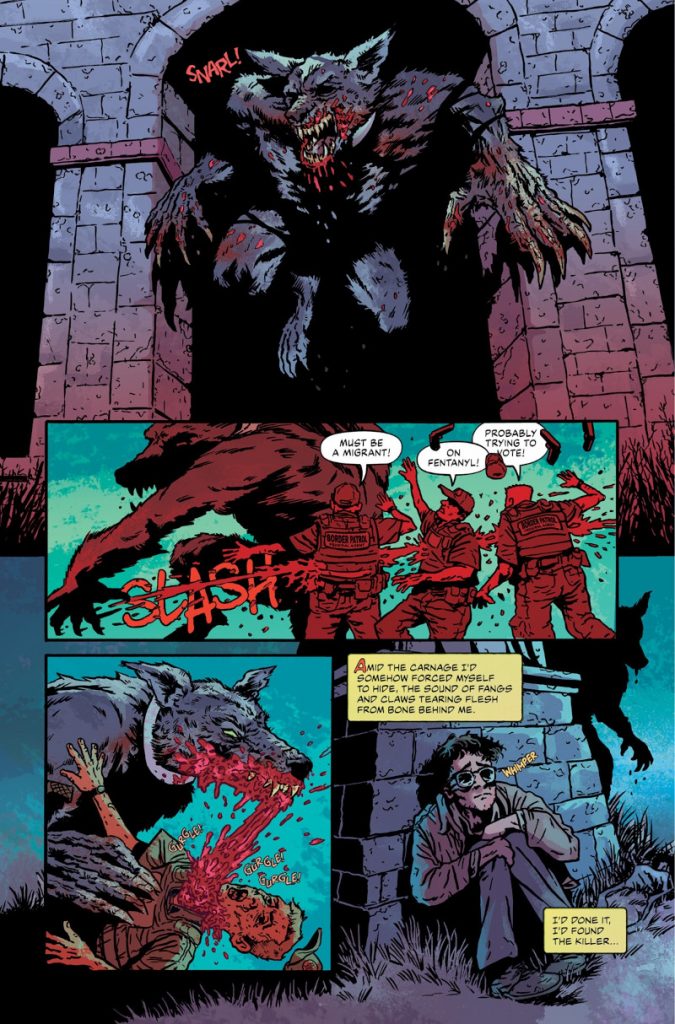
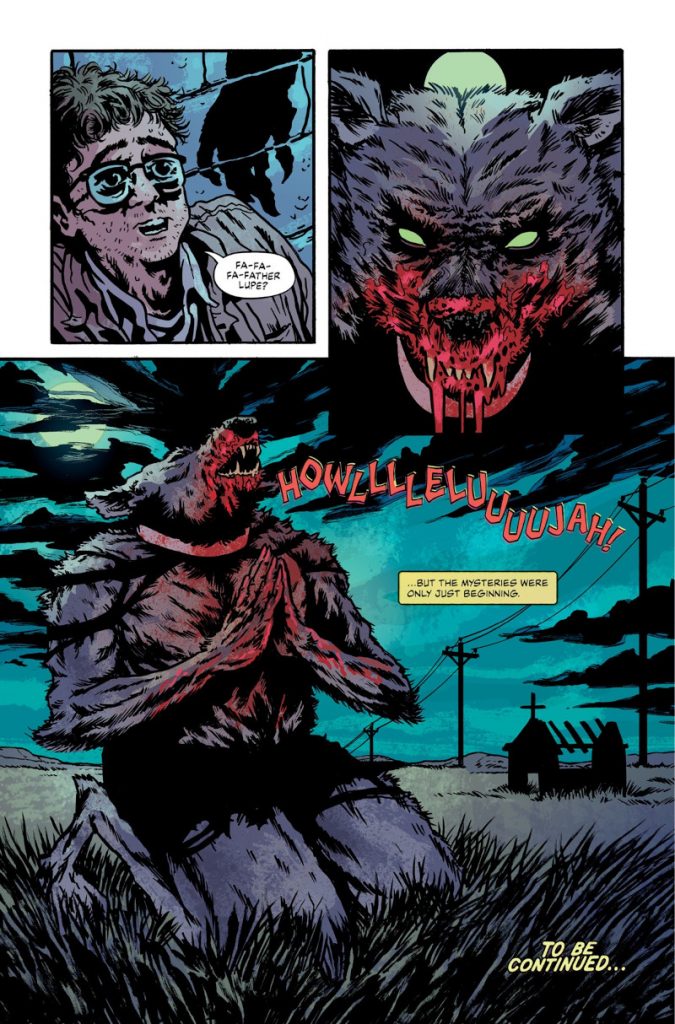
But there are two parts in it that surprised me. There’s one bit that involves some ripped from the headlines phrases that are used in a very specific moment, and then another involving a prayer sound effect, 2 both of which sent it speeding towards comedy in a way that I did not expect. How do you view this from a genre standpoint? Or do you not view your own projects from in genre terms?
Zack: I definitely see it as a horror comic, But I think the horror of it is maybe not what’s on the surface. The werewolf fighting border patrol agents…those are genre trappings, but the way I thought about it was the horror of it is the young idealistic person colliding with the reality of the world. I was thinking of the actual horror story beneath playing with the monster of the week genre horror with a bit of a Southwest flair to it.
And yeah, when you’re talking about with the sound bites, a bunch of media commentary found its way into the book, usually with a funny voice to it. I mean, I hope people get a kick out of it.
I want to tell you my favorite part about the book and I’m sure that this is the intent for it. I went in expecting werewolf priest, and that is true. But you very much established this as a Twilight Zone-like anthology. Actually, I feel like a better comp might be…did you ever watch Eerie, Indiana?
Zack: I did watch Eerie, Indiana as a kid.
It reminds me of Eerie, Indiana in the sense that it’s this person who’s not from there that goes into this place that is objectively insane, and then they become a part of it. That’s one of the things I like about this book a lot. The issue does a great job with the werewolf priest concept, but it also introduces a wider, weird world. There’s a lot of potential in the location. Was that the hook for you as much as anything?
Zack: I think so. I didn’t even realize Eerie, Indiana was probably influencing this, but that’s a good connection to draw. But yeah, the location is a big part of it. We tried to build the first issue so we could do a lot more with it than just werewolf priests and hint at some things you might see in it later, if and when we get to do more issues of this.
A big part of that is also drawn from my own experience. I’m not from Texas. I grew up in Chicago. Part of my experience as a young reporter was just the area was so different than everything I knew. I had a lot of personal things to work through with that as well.
South Texas is a place with a lot of legends and ghost stories, but it just felt like a way to exaggerate that overwhelmed, fish out of water feeling. He didn’t really understand the place he had chosen to do his first job.
I hate talking about idea generation because as much as we romanticize the concept, it’s like, where do ideas come from? They come from a joke. How much of what you do is just built from epiphanies, effectively, where you’re like, “That isn’t so dumb. That could be something.”
Zack: Almost all of it. It all kind of starts like that, joking around with my wife or friends about, “You know what would be ridiculous? This.” And then I start thinking about it and it becomes less ridiculous as I build pieces into it. But it takes me a long time to write these scripts. I’m a slow writer and it takes me time to develop these ideas. I need a spark to the initial idea that I can go back to over and over again so I can remember what I was excited about initially.
That’s why these like joke ideas stick with me. Turning what starts as a joke idea into something serious is how I tend to work on my comics more than if I set out to do something serious. I get a little bored with it, and I don’t have that initial joy to it that some of these ideas have.
You need that spark, that little bit of entertainment, that counterprogramming we talked about earlier to find your connection, it seems.
Zack: Yeah, you have to come back and be like, “This is just too good. I need to do it.”
Do you think you’ve gotten faster over your different projects?
Zack: Absolutely. I learn from each one about what I like more, and then I can get to that point quicker. And my revision cycle has slowed down a lot, because my early scripts I had to revise quite a bit. But yeah, with each script I’m getting faster.
You’re working with an amazing team. Anna Redman is great, Brad Simpson’s a pro, Becca Carey is lowkey one of the best letterers in comics, and Jared K. Fletcher is extremely underrated. I love his design work. Do you feel like as you’re doing these projects, you’re learning a lot from your collaborators that you carry into future projects?
Zack: Definitely. I’ve learned from all of them, and I think in a couple of ways. Creatively, you learn a lot from the artists you work with and the way they think about the story. But also, you learn things you can approach your ideas with.
But when it comes to the actual comic making, I can’t understate how much I’ve learned from working with professional letterers and designers about the logistics of doing this and when things need to be done. And even how files need to be saved and stored. There’s a whole language to it that I’ve learned from working with very professional letterers and designers.
In terms of finding your creative partners, how much of that was built from connections you made as a critic and writer about comics? Did you meet any of these people through doing that side of things?
Zack: I think so. I did this weird Extra Eisners thing years ago and had people from across comics nominate Eisner Awards that were not actual Eisner awards. Like if we were going to give Extra Eisners to people, here’s who would get them. I highlighted Brad’s coloring that way. That was a quicker way to get to him saying yes for that, but he’d been featured on Comics Bookcase several times. And then Death of Comics Bookcase, one of the stories was drawn by Nick Cagnetti, and I had interviewed him before we’d agreed to collaborate. Maybe two months before that. We had a video interview and talked Pink Lemonade for an hour and just got along really well.
I think about half of them are probably people I reached out cold to because I enjoy their work and then half are someone I met doing comics journalism.
Why was Anna a good fit for this? Beyond the fact that she obviously did the previous werewolf priest story.
Zack: She’d drawn a variant cover for my first Kickstarter comic Next Door and it had really elevated the campaign. It’s this fun cover with a dog urinating on a real estate sign that has a bunch of weapons sticking out of it. People had reacted so well to that cover and it had generated so much excitement, so I always remembered that, just watching the audience respond to that and laugh at it.
And I’d always thought, wouldn’t it be great to work on a full-length project then? So, when I come up with this werewolf priest idea, I had gone through her Instagram and found that she draws amazing dogs. She had drawn this beer label for the Leeds comic shop, OK Comics. And on the beer label is the owner of the shop and his Basset Hound. And it was great.
I had seen her draw these great dogs. I thought that my script had a little humor to it, and one of the things I like about her work is it can do both things at the same time. It can be serious and funny. And the last thing was the day I had finished the script and was starting to get serious about trying to find a collaborator, she’d posted something on Instagram that day being like, “I’m available for work.”
And I was like, aha!
She’s also good at drawing extremely gruesome things.
Zack: Yeah, kind of surprisingly so. The second page is very gory and sets the tone for how over the top the gore is going to be. When that came back, it was a stunner. I didn’t see some of that coming.
This could have just been a one shot, but instead it’s very specifically #1. Is it your goal to make more of Macabre Valley? Do you have plans for more or is it all very dependent on how the project does on Kickstarter?
Zack: Both. I have plans for more and it is dependent on the Kickstarter. But I’ve already written the second script. I’ll probably revise it a bit, but there’s a second issue done and there’s an outline for the first arc. And yeah, we’d absolutely like to do more. It just sort of depends on how the Kickstarter does and a scheduling. But it’s constructed. The first issue also foreshadows some unresolved things that we want to come back to. So, that’s the idea.
Do you have a specific threshold in your mind of, “This is my personal goal that I need to get to go to #2?”
Zack: No, because the better it does, the faster I’ll be able to do #2. Whatever gap there is between where the Kickstarter ends and the money I need to produce the second issue, I’ll pay out of pocket. So, it’ll just take longer in that instance to be able to get production started again.
But if we are able to hit 10,000 and go above it, we should be able to start a second issue pretty quickly.
Have you considered taking it to a publisher now that you have proof of concept? Is that something you might have even already done?
Zack: It started as a pitch, to be totally honest. Before Death of Comics Bookcase was even underway, we had done the first eight pages as a pitch. And we brought it to a couple places and didn’t work out for any of the million reasons comics pitches don’t work out. And I had thought, it’s a personal story, so I really wanted to do more. And I was thrilled with those pages.
So, I wanted to do more of it anyway, but I had also thought, if people could see the full scope past these first eight pages, I think it would sell itself a bit better too. That was a possibility.
I want to ask about the other side of this. Kickstarters are fascinating because it’s like running a pop-up small business for a short period of time. It’s a whole process over the 30-day campaign. But it requires more work than that. When did you start working on the actual Kickstarter?
Zack: The sort of advertising and the campaign page end of it?
Just the development of the entire thing. It feels like you’ve been talking about it for a while now.
Zack: Yeah. So, I was looking back in my email for something, and I saw that I had finished my first draft of the script in June 2024 and sent it to a friend for feedback. Death of Comics Bookcase fulfillment ended the first week of June last year, and I finished the script by the end of June. So, to retrace my steps there, I think I wrote the script for this issue about 18 months ago. Maybe a little less than that.
Anna had been doing a lot for 2000 AD and some other places in the past year. Then we just waited to line up schedules so she was able to get started on it. I think she was able to start out at the beginning of this year and work on it off and on between other projects.
How much work is the development side of things? Like, the rewards, the stretch goals…here’s a good example. You have a personalized comics journalism 101 Zoom lesson as one of the rewards. How much of the work is all the other things you need to have in place so you hopefully succeed?
Zack: It’s a lot.
First, I’ve offered the comics journalism one-on-one in my last two campaigns, and nobody bites on that.
Hey, they haven’t bit yet.
Zack: Nobody wants to learn. I would love to share what I learned about that.
But yeah, that is a ton of work. The hardest thing is the reward tiers and structuring it in the right way. You want people to read the book, first and foremost. But you need to do it in a way where you’ll meet your goals. So, you need to get the price of each reward tier down to the lowest point that people are going to be willing to pay for it while also maximizing how much goes towards your goal. It’s going to be hard to hit your goal.
There’s no real science to it. I run it by other Kickstarter creators and some publicists who do Kickstarters to get feedback here and there. But I was tweaking it up until the night before launch. Even 12 hours before launch, I was still like, “Should I cut a dollar here? Or add a dollar there?” That kind of thing. It’s a lot of work and thinking on it.
And there’s always more you could do, right? Like, I don’t have a video up on the page. I could have taken a day to shoot a video where I’m talking to the camera and being like, “Hey guys, I’m Zack.” That kind of thing. But I didn’t get around to that. And there’s setting up press, so there’s always more you can be doing. It’s a lot it’s a lot of work.
There are two tracks you’re on when you’re doing this. One is setting up the Kickstarter, and the other is actually making a comic, and you have to figure out when to do which step and how much time to spend on them.
And with the promotional side, it’s so fragmented. How many platforms are there to post on? Do you want to be on all of them? And do you want to build an audience on all those platforms? So, there are time-based and ethical quandaries that get thrown into the life of a crowdfunder.
I think you’ve done it well. It seems like a lot. I’ve never kickstarted anything myself. I do these SKTCHD BOOK annuals each year and I thought about doing one through it almost as a science project. Just to see if it would it make a difference for me, and then I could write about the experience of doing a Kickstarter.
I don’t know if I would enjoy that, though.
Zack: I think you should do it. I feel like there’s an untapped audience on Kickstarter that you would access by doing that, in addition to all the people who already support you. And I’d like to read that article if you take like an anthropological approach to it.
I do think the math side of it is interesting because…you have a retailer tier, right? So, if you price the retailer tier wrong, I imagine there are some people who are doing math and being like, this isn’t fair.
Zack: There are, and they will message you about it and complain. The retailer tier is the hardest thing to price, because you’re asking regular backers to pay $12 for a single issue, but you need to price the retailer tier so that they can sell it in a store alongside other comics that are $3.99 for the same amount of story. So, it’s going to be a little bit unfair in that respect, but single-issue readers don’t want 10 issues of your comic.
I think there’s a culture on Kickstarter where they’ve started to understand the retailer tier and just move past it without looking too hard at it.
I feel like single issues are hard to price on there. It can be difficult to potentially spend $25 on a single issue in some cases. Some people can’t help but think, “That’s a lot more than I want to spend on this.” So, that that side is tough. I feel like it’s easier to price out graphic novels or collections, especially because that work is typically done.
But Kickstarter’s a weird world.
Zack: For single issue comics, it’s very difficult on Kickstarter and you have to have people who really like the idea that also enjoy supporting independent art. It’s not going to look like a value. You’re going to have a price for one comic book that’s more than DC Universe Infinite, so yeah, that’s tough.
And graphic novels do much better. Like, if you can sell something that’s like 90 to 100 pages, people go for that a lot more. Single issues are tough. I want to get to that collection eventually, so I’m working my way up to it.
I want to talk about some bigger picture thoughts. Obviously, this world is a weird and terrible place in a lot of ways. I wanted to ask about the comic book space and the one for comics journalism. You are part of the Eisner-winning site The Beat. You are currently in the midst of a Kickstarter. How are you feeling about that broader world? Hopeful, nervous, positive, negative? Where are you at?
Zack: You can put big sigh in here if you want. But do you mean the wider world of comics or just the world world?
I mean comics and comics journalism. I feel like there’s a vision of what those things are like, and then there’s a vision of what those things are actually like. Those two things don’t necessarily align all the time. And one of the rare people who does both, I’m curious about your perspective on it.
Zack: It’s interesting. There’s definitely a disconnect there. I’ve had pretty famous creators ask me if The Beat is my day job. And I’m just like, no. I’m a volunteer there because I think it’s important. But I feel like I’ve been on a journey with it. And I think everyone has to do this to an extent to figure out why you’re doing it and what you want to get out of it.
I think the contraction of the comics journalism space has sped up that journey for most of the people who are still in it. Those of us still standing are deeply committed to it at this point. I don’t think there are a lot of people dabbling in it. I think there are fewer people than ever with unrealistic expectations of what it might contribute to them.
I work with a lot of reviewers as the Reviews Editor at The Beat, and I make it clear from the beginning that we don’t have resources. There’s not a ton of pay to be had. Most of them are very clear-eyed about it and are like, I want to do this to contribute to comics or whatever. And I think that can be a good thing. Any kind of misunderstanding or misconception has been lifted a little bit.
It’s not a pleasant thing. It’s sad how few resources are available for this. But it’s good that people can make the decision whether this is something they want to continue doing quicker now than ever before.
I’m not trying to devalue the comic side of it, but we’re in a world where Alan Sepinwall, arguably the best TV critic in the world, was laid off from Rolling Stone. Comics is a more dire version of it, because the vast majority of people who do it are volunteers, but it’s also a reflection of just how little money and value there is in writing about anything at this point.
Zack: I know my hometown paper, the Chicago Tribune, laid off Michael Phillips, its movie critic. They’re just not going to have movie reviews. And the Chicago Tribune is the paper that Gene Siskel worked at. These are Chicago newspapers that have a long tradition of world-famous movie criticism, and just last month they decided, “We’re not doing it anymore.” That’s brutal. That’s just a brutal thing to have to process.
And you’re right. Comics is sort of a canary in the coal mine for these problems that are hitting other industries. It hits us first and faster because we’re smaller and haven’t had as many resources. But yeah, now it’s trickling up to movies and it rippled through video games.
It’s a bummer.
I’m so happy I just committed to becoming a full-time comics journalist and podcaster.
Zack: Well, you have a strong foundation built.
I have been doing it for a very long time. When did you start Comics Bookcase?
Zack: January 2018.
2018. I started writing about comics in 2009. I was part of Multiversity Comics and there were Comics Alliance, CBR, Newsarama…I don’t even think ComicBook dot com was around yet at that point. There were other sites, and then there were people who were phenomenal at what they did on their own sites, like David Brothers on 4thletter! and Zainab Akhtar on Comics and Cola shortly thereafter.
Just comparing when I started versus when you started, it was a completely different world. The big sites were no longer as potent as they once were and a lot of those smaller operations that had a big impact were gone and not replaced. It’s such an odd thing to think about how it’s evolved or degraded, depending on your perspective. I do think there’s a lot of great work, but a lot of it has moved to podcasts and YouTube channels.
It’s a different world, but it’s such an odd world, too.
Zack: That shift has been something I’ve felt even in the last seven years, from 2018 to now. People who used to create their own blogs and things like that are now creating YouTube shows, primarily.
I have no idea how to do video. My video powered by prayer and just letting my system do its thing.
Zack: I think we’re about the same age and I feel the same way. I’ve never accessed that medium. I don’t watch YouTube shows to be honest with you.
I don’t either. I only even listen to one podcast and it’s about basketball.
What’s something you think people miss about comic sites and their value?
Zack: I think people get caught up sometimes in what comics sites should be more like. They have a basis of comparison that’s, like, Entertainment Weekly in its heyday or something. Like it should be this comprehensive thing. But I think what people miss is that a big comic site with a lot of contributors is one of your best places to get reactions from thoughtful, readers for your material. Regardless of how they’re writing about comics, it’s still one of the easiest ways to get a read on what a group of thoughtful people thinks about the work you’re putting out.
Thanks for reading this interview with comics writer and critic Zack Quaintance. If you enjoyed this conversation and want to read more like it, or just would like to support the work that goes into it, consider subscribing to SKTCHD. It costs as much (or even less!) than one comic a month and comes with a 7-day free trial.

